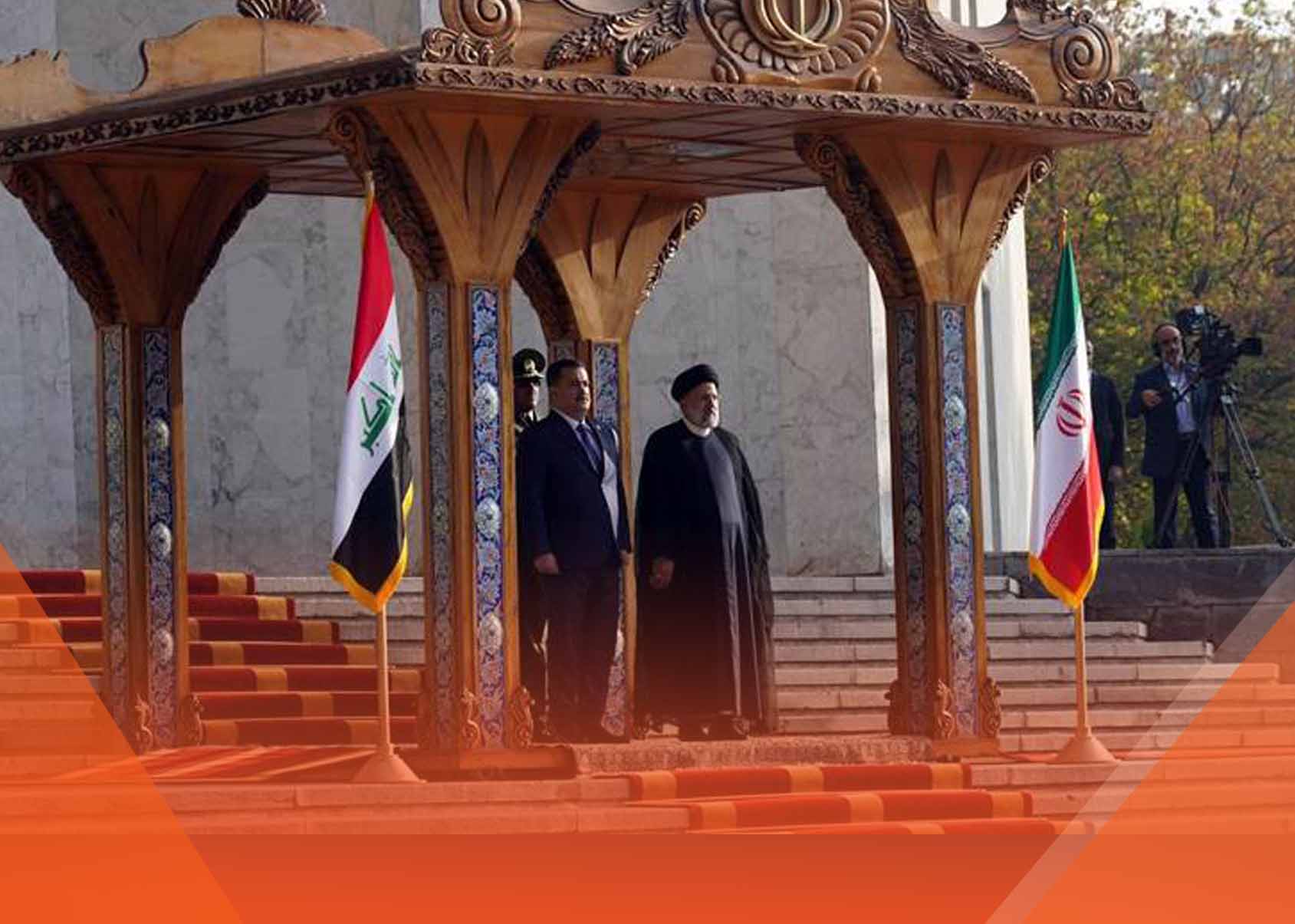The Iraqi Prime Minister has visited Tehran amid mounting pressure from Sadrists, armed groups, and U.S. warnings. He hopes to alleviate some of the pressure on his government by initiating a regional move there. However, it's doubtful he will achieve significant results, as Iraq's status as a conflict zone is influenced not only by regional tensions and the Gaza war but also by the escalating Shiite internal tension, particularly as the provincial council elections draw near.
The prime minister's office clarified that the purpose of the visit was to address "hostilities against the Palestinian people." Notably, Baghdad's stance on the Palestinian conflict as was evident at the UN General Assembly, appears to be even tougher than that of Iran. Furthermore, owing to the Islamic Resistance groups and various Shiite political parties' stance the matter of a ceasefire isn't simply an endorsement for Iraq; they aspire to actively engage in the issue, despite any differing official government stance. It's noteworthy that numerous countries worldwide, including the United States, call for a "Humanitarian Pause," prompting questions about the underlying motives behind Iraq's diplomatic actions.
This visit comes at a particularly sensitive time for the Sudani’s government, which is facing significant pressure. On one hand, the Sadrists have reentered the political arena with heightened enthusiasm, putting pressure on the government over its approach to the war. Following the attack on the Swedish embassy, the Gaza conflict has taken on crucial significance in domestic politics for the Sadrists. They aim to accomplish two goals with this approach: firstly, to take charge of the Palestinian issue and position themselves as heroes within the Shiite world, rather than leaving it to the armed groups of the Iraqi Islamic Resistance.
Secondly, it also places immense pressure on the Sudani’s government, particularly from the "Coordination Framework" faction, which has chosen to overlook the early parliamentary elections issue in favor of solely managing the situation through provincial council elections. Previously, Ammar Hakim, the leader of the National Wisdom Movement, expressed the desire for elections to proceed as scheduled, slated for 2025. The Sudani’s government has committed to a three-year budget and has recently implemented significant security changes, surpassing what even former Prime Minister Adil Abdul-Mahdi attempted, including the removal of Abdul Wahab al-Saadi, the commander of the counter-terrorism forces. Furthermore, the Kurds and Sunnis find themselves in a vulnerable position, and under these circumstances, the holding of provincial council elections could potentially inflict considerable damage on the Sadrists' standing.
The prime minister is expected to seek a solution to alleviate the pressure from Sadr's faction on his government. Notably, in the past year, following a confrontation between Sadr and the Coordination Framework in Baghdad, a letter from Ayatollah Kadhim al-Haeri against Sadr, and possibly an intervention by Ayatollah al-Sistani, Sadr temporarily withdrew from politics. Convincing Sadr was a challenging task for Iran at that time, and while its influence may be limited currently, supporting the government could bolster Sudani's position to some extent.
In the meantime, armed groups have posed a significant challenge for the Sudani’s government. Unlike previous years when they operated under various aliases, these groups, while retaining their distinct identities, have unified under the new banner of "Islamic Resistance," indicating enhanced coordination and centralized decision-making. Additionally, certain factions, like the Hezbollah Brigade and Al-Nujaba Movement have engaged in more assertive discourse compared to and other political groups. Al-Nujaba Movement proclaimed that the Iraqi people have declared war against the invaders. Meanwhile, during the Iraqi ambassadors' conference, Sudani emphasized that the state would determine high-level policies in response to armed groups and political parties attempting to exert control over foreign policy independently of the government.
Indeed, since October 7, the Islamic Resistance has launched over 30 attacks on U.S. bases in the region. However, the nature of these attacks, while militarily low-level, underscores that the primary objective is not necessarily inflicting damage but rather pressuring the United States to withdraw from Iraq. This intent becomes evident in recent statements from figures like Hadi Amiri, who called for the U.S. departure from Iraq. Within less than a month, two aircraft carriers, the Gerald Ford and the Eisenhower, have been deployed to the Mediterranean and Red Sea, with the possibility of one heading toward the Gulf. With two aircraft carriers and established ground bases in Iraq, Syria, Jordan, and even Turkey, along with a fifth naval command in Bahrain and CENTCOM in Qatar, the United States has a significant presence, which serves as a powerful deterrent in three vital locations: the Suez Canal, Bab al-Mandab, and the Strait of Hormuz. This strategic positioning may not align with Iranian and anti-American groups' interests. Consequently, despite Sudan's desire to mitigate attacks, tensions are likely to persist unless a ceasefire is declared.
Sudani's visit occurs amidst criticism from Shiite and Sadrist factions due to his meeting with the US Secretary of State. The US pressure on the Sudani's government appears to be primarily aimed at conveying a message to armed groups and Tehran, as controlling the various parties could prove challenging. The situation in Iraq and Turkey's stance at this time will carry significant implications for US policy regarding the influence of Iran and its allies. Consequently, on his second visit to the region since October 7, Secretary Blinken has engaged with both countries.
Conversely, this conflict was the least favorable development for the Western powers, particularly at a time when their attention was absorbed by the ongoing conflict in Ukraine. The US strategy of promoting resolutions to the Palestinian problem through state agreements, exemplified by the Abraham Accords, has yet to yield significant results. Presently, the Western agenda is not solely focused on averting an escalation of the conflict but also on addressing the heightened influence of Iran and Russia in the region.



